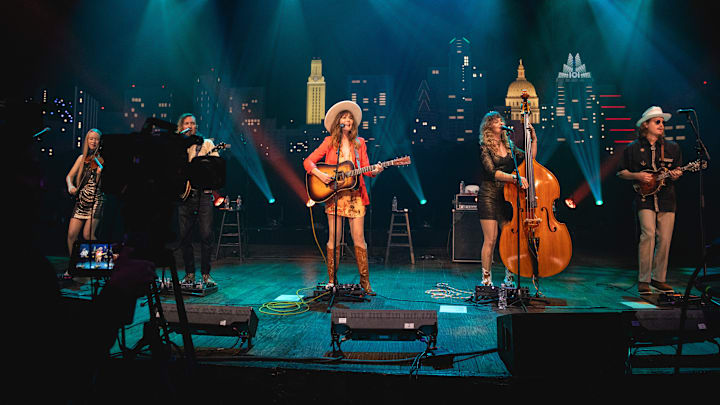“I always thought shows at the 9:30 Club started at 9:30. I thought that’s why it was called the 9:30 Club.” That’s what Molly Tuttle told the sell-out crowd at Washington, DC’s venerable music hall on Tuesday night, as she and her band Golden Highway closed out the east coast leg of their Last Rodeo tour.
Fortunately for both the band and the 1,200 fans who packed the floor and balconies, Tuttle and crew hit the stage at 9:00, after opener Willi Carlisle got things revved up.
Tuttle, flanked to her right by banjo and fiddle, and to her left by bass and mandolin, pounded on her acoustic Gibson through a 23-song set that drew heavily from her last two albums. The effects were often electric.
Though she stands front and center, Molly Tuttle, who at 30 has won too many bluegrass guitar awards to count, often takes a back seat for much of her show, allowing the other four members of her elite ensemble to shine. Banjo player Kyle Tuttle (no relation) took the Dave Matthews part in the duet "Yosemtie" and served up a blistering intro to the psychedelic "Alice in the Bluegrass." He also got the best line of the night, when introducing "Yosemtie," a song about the breakup of a marriage. Noting how many times they had been asked about whether he and Molly were siblings, cousins, spouses, ex-spouses, etc… Kyle reminded the crowd “Hey – this is bluegrass music. There does not have to be one right answer.”
Molly Tuttle and the Golden Highway are near-perfect at the 9:30 Club in DC
In the second half of the show, demarcated by Molly alone on stage singing a lovely "The First Time I Fell In Love," it was mandolin player Dominick Leslie’s turn to grab the stage. He dueted with Tuttle on a high-octane version of "Over the Line" and followed it by taking lead on a simmering "Dooley’s Farm."
All the while, fiddler Bronwyn Keith-Hynes, Tuttle’s classmate for the Berklee School of Music, would stalk in from stage right. Early on, she led a riotous version of her own instrumental "Open Water," and toward the end of the show offered up a blistering solo on Casilleja that would have easily topped both Johnny and the Devil and won that golden fiddle.
Bass player Shelby Means sang lead on the bluegrass standard "Sleepy Eyed John," and kicked off a moody cover of Jefferson Airplane’s "White Rabbit," which played as a companion piece to Tuttle’s weed-saturated "Alice in the Bluegrass."
Speaking of weed, Tuttle was clearly having a blast on two of the most upbeat numbers from her latest City of Gold album. Being in Washington, she moved her “political” song "Down Home Dispensary" – which pleads with the state legislature of Tennessee to legalize marijuana – early in her set. And she bookended it late with a free-wheeling "San Joaquin," all about the joys and occasional pitfalls of moving product. City of Gold is the most pro-pot statement from a musician this year, apart from anything uttered by Snoop Dogg.
Other highlights of the show included the epic "El Dorado" and the fun-loving "Side Saddle," performed back-to-back early on, and a powerful rendition of the title track from Tuttle’s breakthrough 2022 album Crooked Tree. I have heard Molly Tuttle discuss her childhood onset of alopecia, but until Tuesday I had never seen her remove her long wig and perform the song without a single strand of hair on her head. The effect was potent.
Though Tuttle can play guitar as well as anyone alive right now, she only showed off that skill occasionally, preferring instead to provide a solid backdrop for many of her songs while her bandmates stepped forward. With no drummer on stage, Tuttle’s guitar often serves as the floor from which many of her barn-burning numbers arise. Fortunately, she has no trouble doing this, while still serving up barn-burning licks when needed. One of the things that jumps out at you watching Golden Highway is just how much sound 27 individual strings can generate when in the hands of people whose skill and passion are at such a high level.
Willi Carlisle, a big old country boy from Kansas, opened with a forty-minute set in which he swung back and forth between guitar, banjo, harmonica, and accordion. He is loud and boisterous and talks fast and talks funny, telling stories about his life and his songs. His standouts included "The Arrangements," a poignant tribute to bad fathers (“It’s sad when assholes die”) and an a cappella version of Steve Goodman’s adaptation of the traditional "Ballad of Penny Evans," an anti-war lament that resonates today as much as it did when Goodman did it toward the end of the Viet Nam War.
As befits her generosity as a performer, Tuttle had Carlisle join the band onstage for their final encore, a down-homey version of Bob Dylan’s "You Ain’t Going Nowhere," in which all six musicians crowded around an old-school radio microphone and each sang a verse. It felt like the end of a tour.
Tuttle has a little time off the road before heading to the UK for a brief tour in early 2024.
